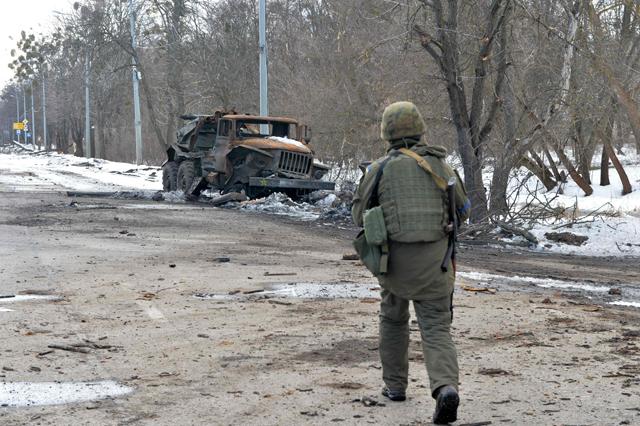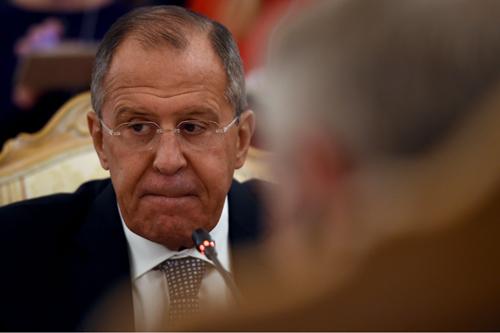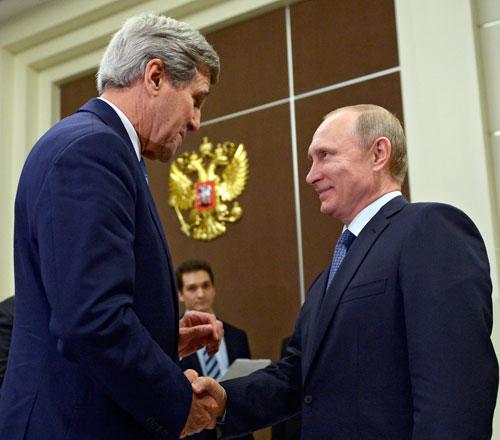You are here
Russia’s Lavrov says ties with Washington need ‘reset 2.0’
By Reuters - Sep 28,2014 - Last updated at Sep 28,2014
MOSCOW — Moscow called on Sunday for a new "reset 2.0" in relations with Washington, saying the situation in Ukraine that had led to Western sanctions against Russia was improving thanks to Kremlin peace initiatives.
Washington and Brussels accuse Moscow of supporting a pro-Russian rebellion in east Ukraine and have imposed sanctions, which they have repeatedly tightened since Russia annexed Ukraine's Crimea peninsula in March.
The conflict has brought relations between Moscow and the West to their lowest level since the end of the Cold War. US President Barack Obama said last week that the sanctions could be lifted if Russia takes the path of peace and diplomacy.
In television interviews, Foreign Minister Sergei Lavrov said it was time to repeat the "reset", a word Washington used to describe an attempt to mend ties early in Obama's presidency.
But he also lashed out at NATO's "Cold War mentality", criticised Washington for excluding Russia's ally Bashar Assad from its campaign against Islamic State fighters in Syria, and said Washington "can no longer act as the prosecutor, the judge, and the executioner in every part of the world".
"We are absolutely interested in bringing the ties to normal but it was not us who destroyed them. Now they require what the American would probably call a 'reset'," Lavrov said, according to a transcript of one interview on his ministry's website.
"The current US administration is destroying today much of the cooperation structure that it created itself along with us. Most likely, something more will come up — a reset No. 2 or a reset 2.0," he told Russia's Channel 5 television.
Shortly after Obama took office in 2009, his then Secretary of State Hilary Clinton presented Lavrov with a red “reset” button intended to signal a fresh start to relations that had been strained under Obama’s predecessor George W. Bush.
In a diplomatic gaffe much mocked at the time, the button bore a Russian label that said “overload” instead of “reset”; the two words are similar in Russian.
Lavrov said that thanks to “initiatives of the Russian President”, the situation was improving on the ground in Ukraine, where a ceasefire has been in place for several weeks.
The September 5 truce is largely holding though some fighting has continued in places including the rebel stronghold of Donetsk.
“The ceasefire is taking shape, though of course not without problems. Monitoring mechanisms have been introduced, talks between Russia, the European Union and Ukraine have started, gas talks have restarted,” Lavrov said.
Western countries say thousands of Russian troops have fought in Ukraine and accuse Moscow of sending weapons, including a surface-to-air missile used to shoot down a Malaysian airliner over rebel-held territory in July. Moscow denies participating in the conflict or arming the rebels.
Cold war
Speaking to Russia’s state-funded international broadcaster, RT, Lavrov said “NATO still has the Cold War mentality”, and Moscow needed to modernise its conventional and nuclear arms, though he denied this would lead to “a new arms race”.
Lavrov also repeated Russian criticism of the US-led air campaign against Islamic State fighters in Syria, accusing Washington of a “double standard” for refusing to cooperate with Syrian president Assad. Washington has repeatedly called for Assad’s dismissal and backed some of the rebels fighting to topple him since early 2011.
“There’s no room for petty grievances in politics,” Lavrov told RT. “I very much hope that the United States will finally... realise that they can no longer act as the prosecutor, the judge, and the executioner in every part of the world and that they need to cooperate to resolve issues.”
Lavrov said that despite the Western sanctions, Russia did not feel isolated on the world stage. Moscow has responded to the sanctions by banning most Western food imports.
“We feel no isolation. But, having said that, I want to emphasise in particular that we do not want to go to extremes, and abandon the European and American directions in our foreign economic cooperation,” Lavrov told Channel 5.
“We have no desire to continue a sanctions war, trading blows,” Lavrov also said. “First of all, it is important that our partners understand the futility of ultimatums and threats.”
Related Articles
BRUSSELS — NATO chief Jens Stoltenberg said Wednesday the alliance was looking to substantially bolster forces on its eastern flank after Ru
MOSCOW — Russian Foreign Minister Sergei Lavrov said on Sunday he had detected increasing US hostility towards Moscow and complained about w
US Secretary of State John Kerry said he had "frank" talks about Ukraine, Syria and Iran with Russian President Vladimir Putin on Tuesday and said it was important to keep in contact.



















